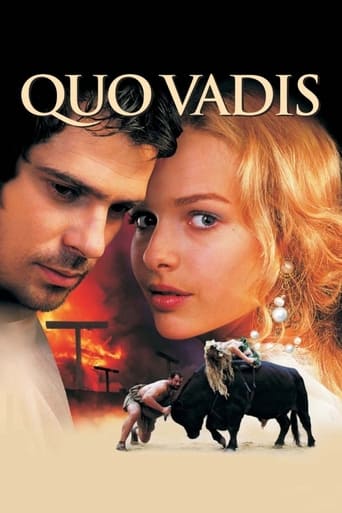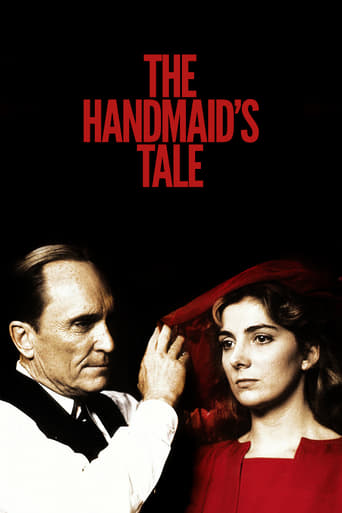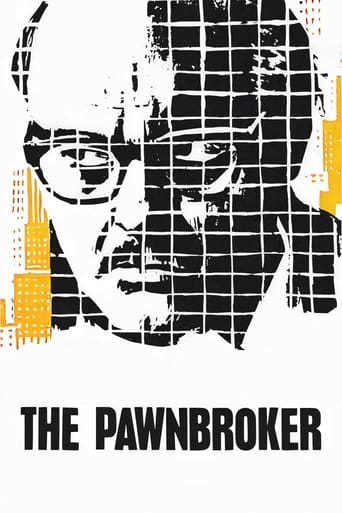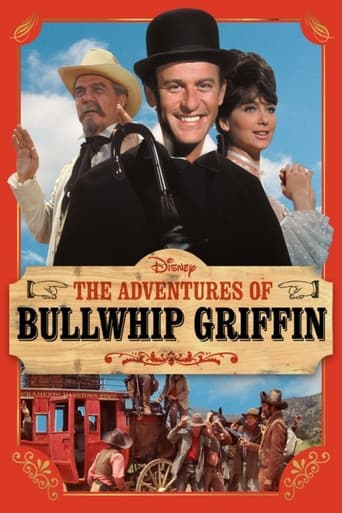

Quo Vadis (2001)
Ancient Rome, during the time of Emperor Nero. Vinicius, a young patrician, falls in love with the beautiful Lygia, the daughter of a Barbarian commander who was killed in battle, and wants her for his concubine. For Lygia, a Christian, being a pagan's concubine is a severe sin and disgrace. However, when Vinicius is wounded, Lygia cares for him, and starts to reciprocate his feelings. Vinicius, in return, becomes interested in Christian learning and asks Apostle Peter to teach him. In the meantime, Emperor Nero accuses Christians of having started a great fire in Rome. He encourages the imprisonment, torture and murder of his Christian subjects.
Watch Trailer
Cast


Similar titles
Reviews
MGM Roman epic QUO VADIS? (1951) has remained one of the top movies among epic buffs. However, its popularity is not so much raised by its source novel but rather by its grandeur of colossal spectacle and magnificent performances. Therefore, after more than 50 years, the movie is still highly entertaining. But a thought may arise...the Noble Prize winning novel QUO VADIS? is not only a historical account of the Rome in Nero's cruel reign but, foremost, a truly insightful, human and thought provoking novel by a great Polish novelist Henryk Sienkiewicz, the novel that masterfully develops human struggles within the corrupted world ruled by an artist, a cynic, a debaucher, an arsonist, a "beast." That thought absorbed the late director, a Pole Jerzy Kawalerowicz, who, in 2000, took up a task to adapt QUO VADIS? for the screen again. As I have seen both the movie and the TV series, my comment will apply to both of them and will hopefully result in a detailed analysis.I would like to analyze this movie in two separate aspects: first, its depiction of historical period, its recreation of the first century Rome (epic features including wardrobe, sets, etc) and, second, its faithfulness to the novel.Kawalerowicz's vision of Rome turns out to be much weaker than LeRoy's in 1951 film. It is short of that lavishness, scenes of crowds, magnificent wardrobe and that tension of splendor. The Roman Empire appears to be "closed up" and laconic. Consider, for instance, the burning of Rome which is condensed, hardly shows the event realistically being a glimpse on the seemingly small group of people in panic. Nero does not sing playing his harp while viewing the burning city from his balcony but he sings on an aqueduct in the middle of a sunny day. The palace occurs to be deprived of that grandiosity we found at LeRoy's. These flaws go in pairs with some technical weaknesses. Let me mention, for instance, the famous bullfight where Lygia is tied naked to the bull but Ursus appears to keep control over the animal from the very beginning. The bull barely moves and people's reactions are fake. Therefore, the movie faced strong criticism and, indeed, if we consider QUO VADIS? in terms of its recreation of Rome only, it is a flawed epic.However... The movie is a very faithful adaptation of the novel and catches the gist of what Sienkiewicz wanted to convey. First, this has to do with the characters. The director develops Chilo Chilonides (Jerzy Trela) the character that was almost skipped in the American version. The story of this man who is once ironically called "the king of the state of wickedness" is so psychological that the entire movie about him would suffice for a meaningful story. His character indeed makes one find forgiveness meaningful and conscience universal. Chilo is beautifully portrayed by Jerzy Trela in a magnificent performance. In Nero's court, we have an accurate insight into "Nero's evil spirit" Tigellinus (Krzysztof Majchrzak) who prompts most crimes of the mad emperor. The depiction of Christian characters is also very accurate. What strikes us among Christians is the living example they give to the pagans and thanks to that example, they convert many people. In this respect, I would like to mention the arena scene - this movie really supplies the viewer with the gore of it, the camera goes in between the martyrs and you as an observer are really affected by the depiction. What touched me most is the baby consumed by a lion while the whole crowd is being mute to this tragedy as if it were totally unnoticed. The movie also depicts the arbiter of elegance, Petronius (Boguslaw Linda), as a witness of dying Christians (in accordance with the novel). That is what I like most about 2001 QUO VADIS? It makes use of the themes developed in the novel.As far as the performances are concerned, there is a great acting and a poor acting. The leading cast Pawel Delag as Marcus Vinicius and Malgorzata Mielcarz as Lygia are good though Delag sometimes leaves much to be desired. He, unlike Robert Taylor, does not clearly portray his character's glorious way from the triumph of conquest to the triumph of spirit. He appears to be very sympathetic from the beginning, no proud Roman leader at first and a devoted believer later. Michal Bajor is not very good as Nero but it is not the looks that make his performance flawed but his talk. I liked Boguslaw Linda's portrayal of Petronius and Krzysztof Majchrzak's Tigellinus. Except for the aforementioned Trela, Franciszek Pieczka does a fine job as Apostle Peter, a calm hearted fisherman of Galilee who once left his barge and gave his total self to the Lord.Finally, I would like to add one more feature of the film: its ability to talk to viewers' hearts. Unlike many epics that draw our attention rather to the spectacle, this movie gives us an insight into particular moment of the human history at the dawn of the new faith. It seems to ask a viewer a question of importance: What is it to be a person? Is it possible that one human feasts and laughs watching lustfully the other one dying in horrific pain? Is the world really mute to the moving cry of a little baby consumed by the beast of hatred, political correctness or indifference? "Quo Vadis Domine?" "Whither Goest Thou, Lord?" Peter asked Christ on the way. He heard the answer "To Rome, to be crucified the second time" The memorable question that appears at the end of the movie seems to be the question of many people of our times: "Where are you going, Lord?" people who subtly predict the answer in their hearts: "To the innocent who constantly suffer most"
This movie impressed me greatly. Seeing the grand coliseum scenes, movies like Gladiator feels like cheap imitations.Excellent acting, pacy, and sensitive, I consider Quo Vadis on par with UNDERGROUND, the Emir Kusturica classic.Hope a wider audience can catch this in theaters, even a DVD wont pay justice to the wonderful sets, costumes etc. I saw this in the Polish film festival in Chicago.
Inevitably, this film begs comparison to the three other recent Polish historical "super-productions", Ogniem i Mieczem, Pan Tadeusz, and Przedwiosnie. Quo Vadis isn't made with quite the elegance and visual grace of Pan Tadeusz, nor is it quite as dynamic and classy as Przedwiosnie, although it is elegant, visually graceful, and dynamic. It shares similarities, unfortunately, with Ogniem i Mieczem as well: at times it reverts to Hollywood-style kitsch, such as with close-ups that take themselves too seriously, and tacky, forced, over-dramatic music. However, these elements are both less frequent and less pronounced than in Ogniem i Mieczem; and - if you allow yourself to ignore them - are overpowered by many positive elements.Boguslaw Linda is great as Petroniusz. This is, I think, one of his best roles for years, and he produces the grace and dignity of a Roman gentleman very well. Michal Bajor's characterisation of the naive, vain Nero, at once contemptible and likeable, was for me one of the nice surprises of the film.The scene where lions tear Christians apart in the circus is shocking and heart-wrenching, and looks almost as realistic as I could imagine is possible. The famous scene where Ursus battles the bull in the circus is, if not as spectacular as the lions, similarly effective.Not a masterpiece, but a very good film. 8/10
i'd be proud of this movie but i can't. it's rubbish. except of some actors' playing this film is from some kind of another film dimension.boring, ghastly filming and without even one positive mark. keep away of such movies if you want to take care of yourself. i don't like "gladiator" but it's ingenious comparing with the polish "movie". greetings.














